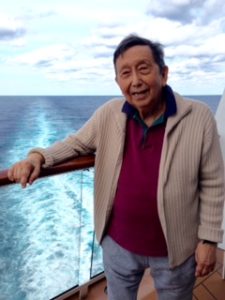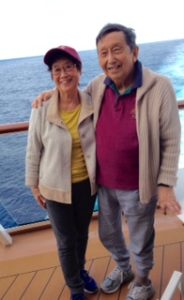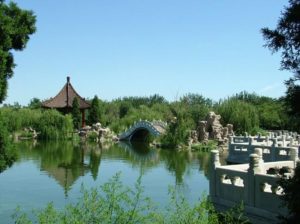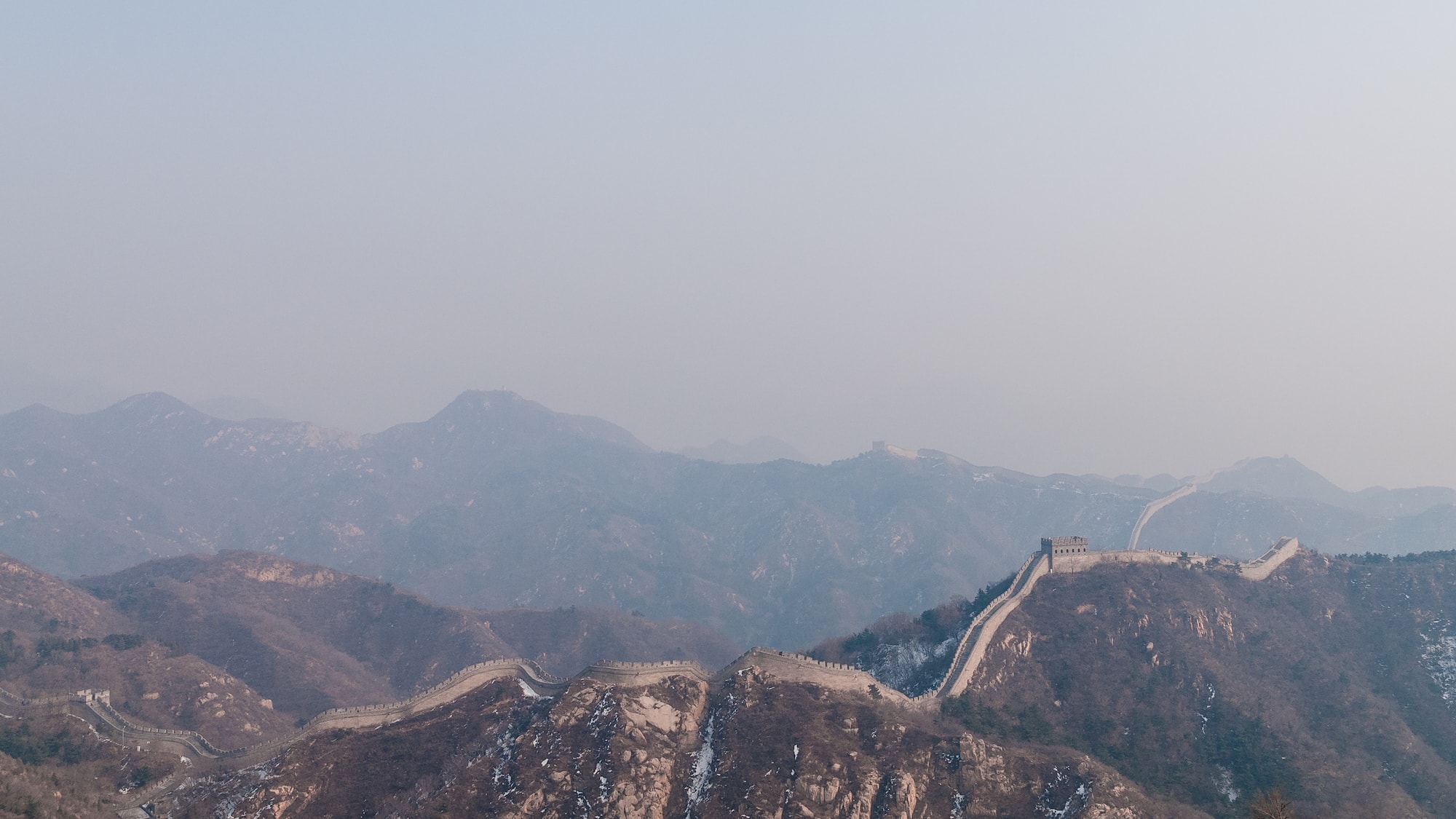Dr. Paul T. P. Wong’s autobiography, A Lifelong Search for Meaning: Lessons on Virtue, Grit, and Faith, is published in weekly installments. Stay updated here.


We are on a cruise ship celebrating my 80th birthday. The smell and the view of the ocean floods me with many memories of my life-changing voyage from Tianjin to Hong Kong in the December of 1948.
I can’t step back into the past, which is forever gone with my childhood; the past is no longer the same, seen from the lens of an old man. But some memories remain as vivid as yesterday.
We Escaped and Became Refugees
It was a last-minute decision in a chaotic time just before Tianjin fell into the hands of the Communist Liberation Army. All kinds of news and rumors were circulating within the family. My mother was frantically packing what we could take. My father had gone to Shanghai to take care of some urgent business. As an 11-year-old boy, I was caught up in the excitement of moving to Hong Kong and the fear of an uncertain future.
After my older brother fought off a rebellious young servant who tried to prevent us from taking our belongings, we travelled to the port. Fortunately, we were able to board the last ship leaving Tianjin. My father had to pay the crewmen gold for yielding their own berths to us.
Shortly after departure, we were terrified by the sounds of gunshots and bullets ricocheting off the ship. “Oh no, the Communists are coming!” I thought. Later, however, I learned that the retreating Nationalist Army was trying to capture our ship to escape as it sailed through Tianjin’s Hai River.
Most days, we just lay on a crammed bunkbed feeling seasick. My youngest brother Oscar was just a few months over one year; he cried a lot because of the discomfort and not being able to play in a very restricted quarter.
During the long journey, my heart was heavy with the sorrow of saying farewell to my teacher and friends at the Four Friends Primary School, a small private school. I also missed our tutor, who later on married my youngest uncle, especially when I hugged the Buddha statue she gave me.
I still remember the last scene of my home in Tianjin. When I ran upstairs to take one last look at my room, I was surprised to see that our tutor was waiting for me to give me a statue of Buddha as a goodbye gift. I was very moved that she was there, sitting on my bed. She gave me a big hug before I rushed to join my family downstairs.
The only adult other than my mother who went with us on that voyage was the secretary from my father’s company. “I need her to set up my company in Hong Kong,” Father said to us. Little did we know that she was Father’s mistress, who set up a separate household in Hong Kong and later gave Father two sons. I have never met my half-brothers, and I have often wondered what has become of them and their mother.
It was a long and exhausting journey. My sister suffered the most from seasickness, and the cabin was full of the bad odour of her vomit. Except for a short time docking at a Korean port, our ship, loaded with refugees like us, was alone in the open sea, sailing on calm shining waters or bobbing up and down through raging storms.
My future and my life were in the hands of the captain and the Sky God. At that time, I even feared that we might never arrive at Hong Kong. At night or during storms, I instinctively prayed to my Buddha statue for a safe journey.
It seemed to take forever. The only constant sound was the monotonous din from the engine rook. If I recall correctly, it took about one month before we finally arrived in Hong Kong.
When we first got off the ship, we had difficulty walking. It took some time to get adjusted to being on land again. Father set us up in a Kowloon hotel as a temporary measure. This became our home for about one to two months. Thus, we started our life as refugees in a strange land, where people spoke a totally different dialect.
At that time, Hong Kong was swamped by refugees from China, fearful of the Communist Party’s brutal measures against business people. We were glad that Father made the decision to escape, because many of his business associates were either imprisoned or executed during the endless political movements, such as the lesser known Three-Anti and Five-Anti Campaigns and the notorious Cultural Revolution.
My uncle, who was my father’s business partner, barely escaped with his life, disguised as a farmer. He had to be smuggled into Hong Kong. My father and uncle’s only crime was that they had become rich through hard work and business ingenuity. At that time, we were conducting imports and exports with the USA. Today, they would have been richly rewarded rather than hunted down by the government as criminals.
Personally, I don’t think I would have survived the cultural revolution, given my outspoken nature—I would have spoken up against all its excesses and abuses of basic human rights and human dignity and then faced the consequences.
My People, My Country
My childhood memories were mostly pleasant, except for the one traumatic experience of being forced out of our own house by a Chinese traitor supported by a group of Japanese soldiers with rifles.
We later resettled in another house, inside what was known as the British Concession. It was a quiet neighborhood with streets lined with tall trees. I had many pleasant memories riding my bicycle with my friends.
 Another pleasant memory was boating with my older brothers on a river. The scenery was so serene and picturesque. We spent hours on the river, and fishing was just an excuse for being close to nature. No wonder so many Chinese paintings and so much of the poetry is obsessed with the exquisite out-of-this world beauty of the Chinese landscape.
Another pleasant memory was boating with my older brothers on a river. The scenery was so serene and picturesque. We spent hours on the river, and fishing was just an excuse for being close to nature. No wonder so many Chinese paintings and so much of the poetry is obsessed with the exquisite out-of-this world beauty of the Chinese landscape.
Of course, I remember the Buddhist temples. We had to visit one of the temples at least once a year to burn incense and pray for Buddha’s protection.
The innermost chamber of my mind is populated with many happy childhood memories:
The roosters welcoming the dawn with their eager crows.
The golden wheat field gleaming under the sun and the weeping willows swaying gently in the wind.
The crickets chirping from tall grasslands and the frogs croaking near the river bank.
A lonely boat gracefully gliding through an arched stone bridge.
The aroma of chestnuts roasted in black sugar floating up in the wintry air.
A dust-colored sun slowly vanishing behind the ancient cypress trees.
What I miss most were my relatives, my friends, and all the people in Tianjin. They were such down-to-earth, honest, and sincere simple folks. There seemed to be a natural bond between people that made you feel emotionally close and secure.
I have not met such people in Hong Kong or in Canada, where I have felt like an outsider, a stranger, and a misfit. I still feel like an orphan in search of a home where I can feel totally accepted and safe. I love Taiwan so much, because whenever I lecture in Taiwan, my friends there reignite the same kind of feelings of intimate bonds.
Maybe there is no country for someone who follows a different drummer. Maybe there is no permanent residence for a sojourner guided by an invisible hand.
Still, my thoughts turn again and again to China, especially in my old age. Often, I think about my motherland, my people, and my family. They are all gone now, having left one by one—my grandparents, parents, uncles, and aunts; they have gone the way of all my ancestors.
These fragments of remembrance bring to mind Li Shangyin’s sentimental poem: “How splendid the sunset, but alas, the dusk is falling fast.”
When I said goodbye to Tianjin, I never thought that I would become a voluntary exile for more than half a century. When I finally returned to Tianjin about five or six years ago, I visited my old neighborhood on Racetrack Road and located a house with high brick wall, very similar to my old house. My older brother told me that it was now occupied by a Communist official. My brother had tried for many years to reclaim our property in China without any success.
Oh, China, I Cry for You
Neither time nor space can sever that special tie between me and my motherland. China is in my blood, in my DNA, and in the innermost recesses of my being. Yet, whenever I think about China, I am overcome by a nameless sadness, similar to the sentiment expressed by the poet Du Fu:
The ceaseless Yangtze gushes on and on (不盡長江滾滾來)
Ten-thousand miles of sorrow my constant companion (萬里悲秋常作客)
Flowing down from high mountains and gorges, through the central plains into the Pacific Ocean, Yangtze, the Mother River of China, has been a blessing and a curse to millions of Chinese people. Down through history, it has brought China both prosperity and desolation. It continues to flow forward as it has done incessantly since ancient times.
To me, China remains an impossible enigma, a country of incredible contrast and contradiction! The mystical kingdom from antiquity is now a political and economic giant on the world stage. It is an immense land blessed with incomparable beauty and creative people, but also cursed with unimaginable suffering from natural and man-made disasters. It is the cradle of the oldest humanistic thoughts, but also home to some of the most brutal and oppressive regimes in human history.
Oh, China, I cry for you! Throughout your long history, how many brave sons and daughters have given their lives for their patriotic love? How many idealistic reformers have suffered imprisonment and death? How many parents have spent their old age in tears and pain because their children can never come home again? How many kind-hearted innocent people have been falsely accused and killed?
Your enormity magnifies all your virtues and sins. A slight nod of a head can bring a hundred flowers to bloom; a slight wave of a hand can send a thousand people to their graves. Your mighty power presents great promises and threats to your people.
Oh, China, I have watched you from a distant land, but with the intensity and interest of a kinsman. Your every move touches me deeply. You have brought me pride and pain, joy and sorrow. Through it all, you are still on my mind and in my prayers.
I don’t remember exactly when and where I wrote the following paragraphs, which I discovered by chance in an old notebook (I have hundreds of such notebooks that record my thoughts), but they still capture my feelings as I think about my homeland.
I stand alone on the beach. The waves leapfrog towards the shore, until they caress my bare feet with tenderness; they come again and again, lest I walk away. But I stand motionless, frozen in time and transported to a different land.
As I gaze into the distant horizon, dotted by isles and fishing boats, I am homesick for my homeland beyond the deep blue sea. When will I kiss the land where I was born? When will my people be free as fish in the ocean and birds in the sky?
When the darkness around me deepens, a throbbing pain pierces my heart. I feel like an exile without a country and a prisoner of my own aging body. My mind still wants to soar with many a dream, but my tired body longs to lie down. Does anyone hear my soul’s cry? Will anyone discover my footprints on the sand?
When I look up to the twinkling stars and feel the cool ocean air brushing against my face, my spirit is gradually revived. Silent, speechless, shy—and yet they beckon me to look upward to the sky, to the highest heaven, to my heavenly home. Yes, I am coming home soon when my task is done.

 Meaning Conference 2025 will be the INPM’s first in-person conference with a virtual option after the pandemic.
Meaning Conference 2025 will be the INPM’s first in-person conference with a virtual option after the pandemic.